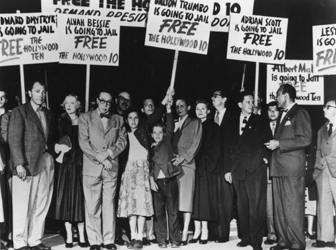1947 HUAC begins its investigation of Communism in Hollywood
Since World War I the American House of Representatives had set up a number of committees to investigate foreign subversion in the United States. Their scrutiny fell on supporters of both fascism and communism, or anyone who might incite disloyalty, such as Japanese residents of California during World War II.
In 1945 these ad hoc investigations were replaced with a permanent format: the House Committee on Un-American Activities which came to be known as HUAC. It was HUAC that would unmask Alger Hiss as a Russian agent who had worked in the White House, and in 1947 the committee turned its attention on Communist infiltration of Hollywood.
This set of hearings found easy pickings. Hollywood was full of those who had supported the Soviet Union at one time or other, particularly during the Spanish Civil War (1936-39) and during World War II when the Soviets were an ally. Having been associated with such pro-Stalin movies as Mission to Moscow (1943), which praised the infamous show trials and accused Leon Trotsky of collaborating with the Nazis, or one of the groups set up to send aid to the Spanish Republic, now left many open to charges of sympathizing with Bolshevism. And, to be sure, there was no shortage of genuine Communists and party members in Hollywood, especially among screenwriters and the craft unions. (See the Coen brothers’ comedy Hail Caesar for an exploration of this.)
The committee summoned a string of Hollywood luminaries to testify about their experience with Communism in the film industry. Some of them such as Walt Disney identified others who were suspected of party membership or sympathies but some refused to testify at all. This group, known as the Hollywood Ten included no actors but prominent screenwriters and directors: Herbert Biberman, Ring Lardner Jr, Dalton Trumbo, Edward Dymytryk. They made no apologies about their left-wing sympathies – one of them, Alvah Bessie, boasted that he had inserted pro-Soviet propaganda “subversive as all hell” into his work – but stood on their First Amendment Rights. They were convicted on contempt of Congress and sentenced to a year in jail.
These hearings led to a blacklist of the Ten and hundreds of other perceived Communist sympathizers who were not permitted to openly work in the film industry for decades. Though HUAC had successfully exposed pro-Soviet elements in Hollywood, popular culture would come to view it as part of a witch hunt and make heroes of those who refused to “name names”.
